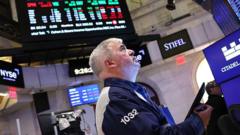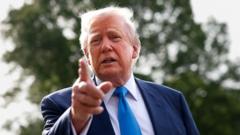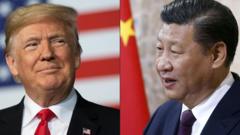In the lead-up to Australia's federal election on May 3, the presence of Donald Trump and his controversial tariffs are reshaping the political landscape. Voters are increasingly concerned about the implications of U.S. policies for Australia, prompting leaders to navigate a complicated relationship with the unpredictable president while focusing on pressing domestic issues.
Donald Trump's Shadow Over Australia's Election Campaign

Donald Trump's Shadow Over Australia's Election Campaign
As Australia heads into a federal election, the unpredictable influence of Donald Trump looms large, overshadowing domestic agendas and forcing politicians to reconsider U.S. ties amidst rising geopolitical tensions.
In Western Sydney, a gathering of Australians swigs beers and feasts on unique fried snacks, enjoying the rodeo—an event that has become a cherished part of local culture. However, beneath the surface of this Americana-inspired scene lies a political climate rife with uncertainty and external pressures. As Donald Trump’s return to power elicits concerns about global trade conflicts, Australia's political moguls are grappling with unexpected challenges that echo the unpredictability of the bull-riding sport.
Trump’s influence is palpable among the rodeo attendees; some, like enthusiastic fan Guy Algozzino, openly champion tariffs, citing the need for protection. Conversely, others, like Jared Harris, adopt a more detached view, absorbing the tumultuous world stage while prioritizing local concerns over international antics. Notably, Australia had previously survived Trump's presidency with relative composure, feeling distanced from the U.S. Yet, the prospect of a second term is met with trepidation, given the direct ramifications that tariffs might impose on Australia’s trade relations.
As the federal election on May 3 draws near, Prime Minister Anthony Albanese’s Labor party, once trailing in the polls, has seen a resurgence as recent polling suggests Labor is ahead. Candidates are finding their campaigns stymied by need to address the implications of an unpredictable U.S. president, with crucial relationships and alliances—such as those within the AUKUS pact—hanging in the balance. Leaders are torn between domestic priorities like healthcare, housing, and economic challenges, and an unsettling necessity to clarify Canberra's stance regarding major global players.
The stakes are high, heightened by China's military maneuvers in the Pacific and the subsequent strengthening of U.S.-Australia ties that could be jeopardized by unpredictable domestic U.S. politics. With Trump's statements revealing a lack of complete understanding of critical alliances such as AUKUS, Australia's political landscape grows increasingly fraught. Some policymakers voice concerns about the sustainability of the U.S. alliance, citing a need for Australia to recalibrate its foreign policy towards more self-interested strategies.
In this charged atmosphere, upcoming debates promise to interrogate the candidates' preparedness to confront U.S. policies head-on. Albanese, facing opposition leader Peter Dutton, will need to reassure constituents about being a stabilizing presence amid global chaos while navigating their fears about Trump-inspired taxation policies.
Overall, the unpredictability of U.S. foreign policy is reshaping political narratives in Australia, leading some analysts to speculate that Trump's tumultuous presidency, rather than disheartening voters, may paradoxically unify them around the incumbent leadership. Though domestically focused, the political discourse reflects a broader anxiety about the future of international alliances and the implications that the U.S. election cycle holds for countries such as Australia, leaving voters to eagerly await their next leader's strategy to ride out the turmoil.




















